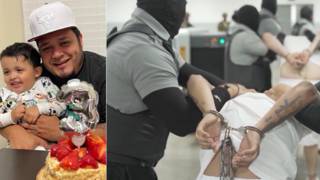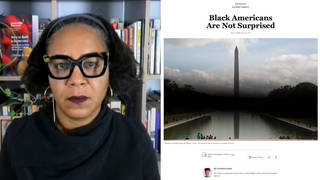HeadlinesFebruary 01, 2005
Zarqawi Vows To Continue Fighting; Calls Election An “American Game”
In Iraq, initial results from Sunday’s election are expected be released as early as today but final results won’t be known for another week. Militant leader Abu Musab al-Zarqawi has vowed to continue fighting despite Sunday’s election. He described the election as an “American game.”
Video Purports To Show UK Plane Being Shot Down
In other news from Iraq, a video was broadcast Monday that purported to show Iraqi fighters shooting down a British military plane killing between 10 and 15 people on board. While questions were raised about the authenticity about the video, it is now widely believed that the plane was shot down. Questions have emerged in the British press over whether the plane was part of a secret special operations effort. It was flying to a site north of Baghdad where there are ordinarily no British soldiers.
Tensions Rise Betweens Kurds & Turkish Over Kirkuk
In the northern city of Kirkuk it appears the main Kurdish alliance will win two-thirds of the vote in a regional election to form the provincial council. This raises new fears that tension could escalate between the Kurds and Turkey. Turkey opposes the oil-rich city of Kirkuk from being the capital of the autonomous Kurdish region. Because of the area’s oil wealth Turkey also fears the Kurdish area may break away from the rest of Iraq and form a separate country.
Four Iraqi Prisoners Shot Dead By U.S Guards
In other news from Iraq, four Iraqi prisoners have been shot dead by U.S. guards inside a jail in the southern part of the country. The U.S. military said the killings came during a 45-minute prison riot. Six other prisoners were injured. Three U.S. Marines were also killed in Iraq on Monday.
Pentagon Considers Raising Payments to Families of Fallen Soldiers
In news from Washington, under pressure from Congress the Pentagon has announced plans to increase death payments by nearly $250,000 to families of U.S. troops killed in combat zones. The proposed rise would be applied retroactively for all troops killed in Iraq and Afghanistan since October 2001.
Guantanamo Tribunals Ruled Unconstitutional
A federal judge ruled Monday that detainees held at Guantanamo have a right to challenge their detention in court and that the military tribunals set up by the Pentagon violated both the Constitution and the Geneva Conventions. The judge, Joyce Hens Green of Federal District Court in Washington, also rejected the Bush administration’s request to throw out lawsuits filed by 54 detainees protesting their imprisonment. The judge wrote that the war on terror “cannot negate the existence of the most basic fundamental rights for which the people of this country have fought and died for well over 200 years.” The decision however contradicts another recent federal court ruling increasing the likelihood that a higher court, possibly the Supreme Court, will take up the issue.
UN Says Genocide Not Occurring in Sudan
A new United Nations report on Sudan has criticized the government and its militia of systematically abusing and killing civilians in the Darfur region. But the report falls short of accusing the Sudanese government of committing genocide. The commission did conclude that some individuals carried out acts with genocidal intent”. Over the past two years, at least 70,000 people have been killed and more than two million people have been forced to become refugees. The United Nations investigators called for the perpetrators to be tried by the International Criminal Court in the Hague. But the Bush administration, which opposes the international court, wants the United Nations to set up a separate tribunal to hear the case.
ElBaradei Criticizes U.S. For Threatening Iran
Chief UN nuclear inspector Mohamed ElBaradei has criticized the Bush administration for discussing the possibility of attacking Iran. ElBaradei said such talk is “very unhelpful” and he encouraged the U.S. try to engage Iran in dialogue over its nuclear program. Two weeks ago, Vice President Dick Cheney acknowledged that the U.S. or Israel may attack Iran. In addition, recent news reports indicate that the US already has secret commandos inside the country and that the Air Force has begun flying over Iranian air space. ElBaradei said “Talk about military activities at this stage is very unhelpful. I cannot see how a military solution can resolve the Iran issue.”
Nepalese King Dissolves Entire Government
In news from Nepal, the country’s King Gyanendra has dissolved the entire government and declared a state of emergency suspending all fundamental rights of citizens. The king claimed the move was needed to “restore democracy and law and order.” Political leaders accused the king of carrying out a coup. Nepal’s ousted prime minister said “It is an anti-democratic step and we strongly denounce this act. This step has thrown the country into a grave crisis.”
Students Say Press has “Too Much Freedom”
A new survey of high school students has found that one in three students feel that newspapers should get “government approval” of stories prior to publication. One third of students also said the press has “too much freedom.” Jack Dvorak, director of the High School Journalism Institute at Indiana University in Bloomington said the survey confirms that students are not learning enough about the First Amendment in school.
NAACP Refuses to Cooperate With IRS Over Probe
The NAACP announced Monday that it is refusing to cooperate with the Internal Revenue Service as the agency investigates whether the nation’s oldest civil rights organization violated its tax-exempt status by criticizing President Bush. The IRS announced its probe weeks before November’s presidential election. NAACP’s interim president Dennis Hayes said the probe “was clearly motivated by partisan politics and intended to divert us from impartial voter registration.” The IRS launched the investigation after NAACP Chairman Julian Bond gave a speech criticizing President Bush’s war, economic and educational policies. The IRS claims Bond may have violated federal regulations that bar certain tax-exempt organizations from engaging in political activity.
Ward Churchill Resigns Post Amid Controversy Over 9/11 Essay
University of Colorado at Boulder professor Ward Churchill has resigned his post as head of the school’s ethnic studies department after an uproar over an article he wrote just after the Sept. 11 attacks. Churchill is a longtime native rights activist and leader of the Colorado chapter of the American Indian Movement. The article in question recalled how US foreign policies in Iraq and its support of the Israeli occupation of the Palestinians played a role in the attack in inspiring the hijackers. In addition Churchill questioned whether the victims inside the World Trade Center should be described as “innocent civilians.” Churchill wrote “they were civilians of a sort. But innocent? Gimme a break. They formed a technocratic corps at the very heart of America’s global financial empire–the “mighty engine of profit.” Churchill accused the victims of Sept. 11 as being among the Americans who were too busy in their own lives to see the abuses being carried out by the U.S. overseas. This week Churchill said “The overriding question that was being posed at the time was 'why did this happen, why did they hate us so much,' and my premise was when you do this to other people’s families and children, that is going to be a natural response.” The essay received little attention until he was invited to speak at Hamilton College in New York. His speech is still scheduled to take place on Thursday. But it has a generated a firestorm of protest. New York Governor George Pataki criticized the school for inviting Churchill. He said ’’There’s a difference between freedom of speech and inviting a bigoted terrorist supporter.’’
Homeless Vet Herold Noel Finds Home
And in an update on a story we covered a month ago — Iraqi war veteran Herold Noel has found a home. When we spoke to him in December he and his family were homeless–even though he had just returned from fighting in Iraq. On Wednesday he moved into a new apartment in the Bronx. An anonymous donor donated a full year of rent and enough money for furnishings. While moving in, he told reporters “My fight might be over, but its not over for all the veterans who are still in my situation. I won’t stop fighting for everyone who ends up like me.”
Most popular
- 1
- 2
- 3
- 4
Non-commercial news needs your support
Please do your part today.











Media Options